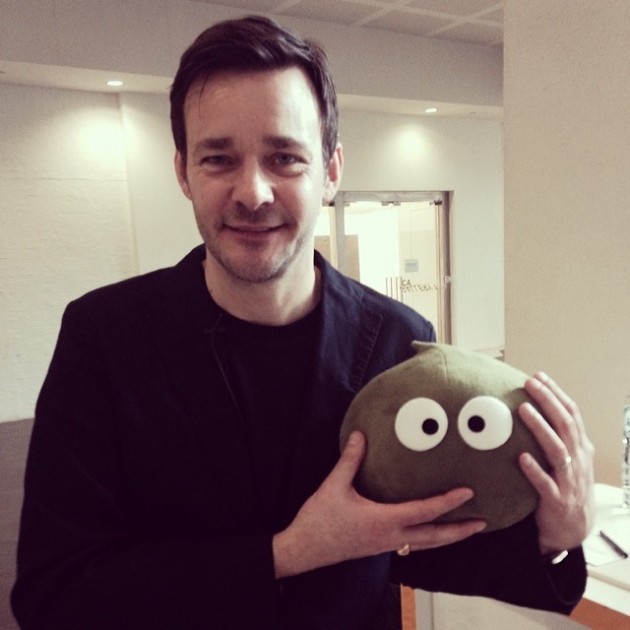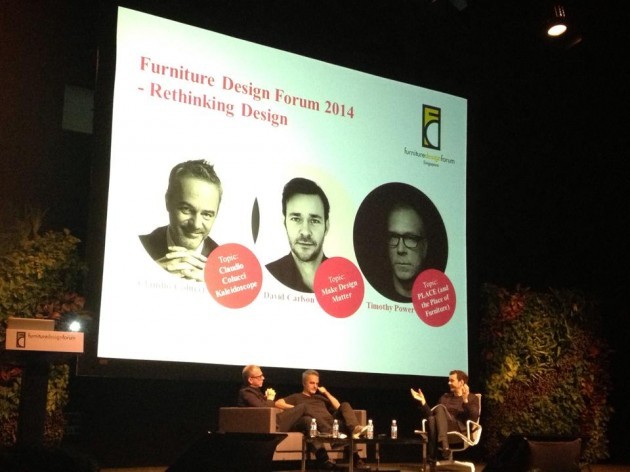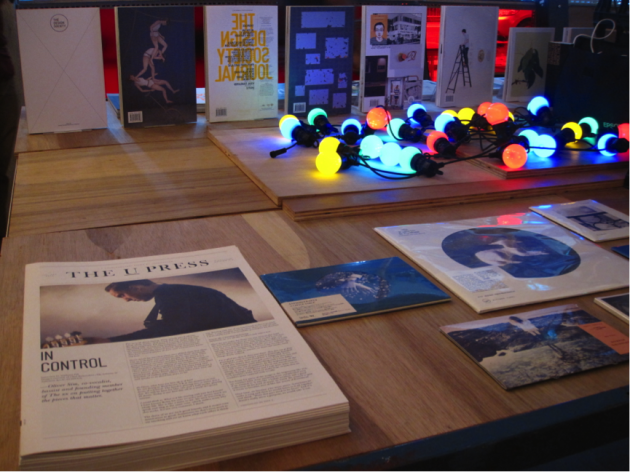A roomful of attendees at different stages in their design career, from a design enthusiast to a design pro to an aspiring Lasalle design cohort, were waiting with bated breath to hear from three esteemed and well-established international guest speakers from the design industry to indulge us with their thoughts on rethinking design.

The 12th Furniture Design Forum organised in conjunction with SingaPlural, the anchor event of the Singapore Design Week 2014, has truly spoilt its audience with a star-studded line-up: David Carlson, Tim Power, and Claudio Colucci.
We break the news on what we heard to all you eager design beavers out there.

David Carlson, a respected thought leader in design thinking imparts us with seven principles based on his recently published book “Make Design Matter”.
-
- 1. Think transdisciplinary, fuse various ways of thought to identify opportunities of revolutionising strategies from product to experience, design to systems, policy to society. There’s a changing role for the designer to bring about unlikely marriages like adopting a termite hill’s architecture into a building’s that enhances ventilation and saves its occupants 90% off an electricity bill!
-
- 2. Take a cultural approach and always look through the lens of humanity. The only thing important about design is how it relates to people.
-
- 3. Act responsibly, be honest! People want to interact with an honest and trustworthy brand, kind of like interacting with a friend. Dare to change the rules to play a better game.
-
- 4. Make it different, standardisation is boring. Find new solutions, even the simplest things can be done in a better way. Think vodka, why does it have to be flavoured sweet instead of savoury?
-
- 5. Share knowledge. Don’t just take, give.
-
- 6. Be intuitive, listen, and keep an ear to the ground. “Skate to where the puck is going to be, not where it has been”, Steve Jobs.
-
- 7. Dare to fail! You learn as much from mistakes as you do your success. Success is hard work
-
-
-
-
-
-
.
Rethinking design: Everything we do should have a reason for being. Think about why you’re doing it, why it’s important, why it should be done in a certain way, and how we can do things differently.

Tim Power is a name well recognised in the architectural field having been in the industry for close to three decades, owning two studios including the acclaimed Tim Power Architects, and exhibiting all over the world in design-centric cities like Milan, Florence, New York, Tokyo and London. He talks about place and the place for furniture in our world today.
As Tim views it, we should try to work as much as possible with and as little against nature. He’s won all environmentalists over at that juncture. So how do we blend land with city and connect nature with a built world? By adopting these six strategies in design: Scalability, horizontal thinking, lightness (he once designed a chair made out of uncooked pasta weighing 900 grams!), responsibility, biodiversity, and connectedness to land, city, and body.
Tim himself has designed furniture and in sync with speaking at a design forum about furniture, he’s got this to say about the need for it: It’s amazing the way you can create domestic living and community with just a building and furniture. Furniture creates intimacy.
Rethinking design: Think in combinations of different dimensions: big to small, halfway to infinity.

Claudio Colucci owns four design practices across the globe under the house brand Claudio Colucci Design. He implores us to think before we create! He believes design is akin to a kaleidoscope – using the same elements to view the world in a different way, as reflected in his contemporary twist on traditional items such as tatami mats, hangers and bento boxes.
Along the vein of David Carlson’s train of thought to think transdiciplinary, Claudio’s most recent work involves a cross between sustainability and nature, designing the most attractive but functional wind turbine to ever exist – a tree wind turbine! Each leaf turns to transform kinetic energy into clean and sustainable energy, amazing.
Rethinking design: You have to travel to gain perspectives and morph different elements into design.

One common theme that ran through their talks is the idea of cross-pollination. We can and should learn from many different fields to ultimately hone in on improving lives and our world through design – such is the beauty of collaborative creativity.
The three certainly left the crowd inspired to rethink the way we thought about and approached design.
At our fifth session of Backstage Pass, a community event for organisers, we too will encourage cross-pollination of ideas across event genres. Join us to find out more and be a part of the action! #homegrownSG #supportlocal
Follow us on Facebook and Twitter to be in the know once sign-ups open, tickets will go fast.
Image credit: SingaPlural







